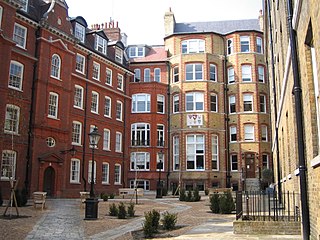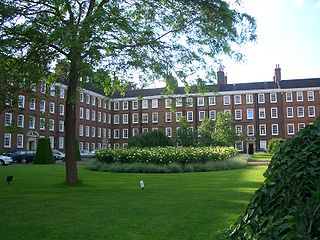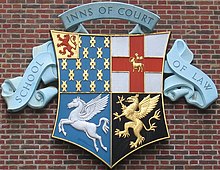
A barrister is a type of lawyer in common law jurisdictions. Barristers mostly specialise in courtroom advocacy and litigation. Their tasks include taking cases in superior courts and tribunals, drafting legal pleadings, researching the law and giving expert legal opinions.

In the United Kingdom and in some Commonwealth countries, a King's Counsel during the reign of a king, or Queen's Counsel during the reign of a queen, is a lawyer who is typically a senior trial lawyer. Technically appointed by the monarch of the country to be one of 'His [Her] Majesty's Counsel learned in the law', the position originated in England and Wales. Some other Commonwealth countries have retained the designation, while others have either abolished the position, or renamed it so as to remove monarchical connotations, for example, 'Senior counsel' or 'Senior Advocate'.

The Honourable Society of the Middle Temple, commonly known simply as Middle Temple, is one of the four Inns of Court exclusively entitled to call their members to the English Bar as barristers, the others being the Inner Temple, Gray's Inn and Lincoln's Inn. It is located in the wider Temple area of London, near the Royal Courts of Justice, and within the City of London. As a liberty, it functions largely as an independent local government authority.

The Honourable Society of the Inner Temple, commonly known as the Inner Temple, is one of the four Inns of Court and is a professional association for barristers and judges. To be called to the Bar and practise as a barrister in England and Wales, a person must belong to one of these Inns. It is located in the wider Temple area, near the Royal Courts of Justice, and within the City of London. As a liberty, it functions largely as an independent local government authority.

The Honourable Society of Gray's Inn, commonly known as Gray's Inn, is one of the four Inns of Court in London. To be called to the bar in order to practise as a barrister in England and Wales, an individual must belong to one of these inns. Located at the intersection of High Holborn and Gray's Inn Road in Central London, the Inn is a professional body and provides office and some residential accommodation for barristers. It is ruled by a governing council called "Pension", made up of the Masters of the Bench and led by the Treasurer, who is elected to serve a one-year term. The Inn is known for its gardens which have existed since at least 1597.
A bar association is a professional association of lawyers as generally organized in countries following the Anglo-American types of jurisprudence. The word bar is derived from the old English/European custom of using a physical railing to separate the area in which court business is done from the viewing area for the general public.
The call to the bar is a legal term of art in most common law jurisdictions where persons must be qualified to be allowed to argue in court on behalf of another party and are then said to have been "called to the bar" or to have received "call to the bar". "The bar" is now used as a collective noun for barristers, but literally referred to the wooden barrier in old courtrooms, which separated the often crowded public area at the rear from the space near the judges reserved for those having business with the court. Barristers would sit or stand immediately behind it, facing the judge, and could use it as a table for their briefs.

The Inns of Court in London are the professional associations for barristers in England and Wales. There are four Inns of Court: Gray's Inn, Lincoln's Inn, Inner Temple and Middle Temple.

In law, the bar is the legal profession as an institution. The term is a metonym for the line that separates the parts of a courtroom reserved for spectators and those reserved for participants in a trial such as lawyers.
The Law Society of Ontario is the law society responsible for the self-regulation of lawyers and paralegals in the Canadian province of Ontario. Founded in 1797 as the Law Society of Upper Canada, its name was changed by statute in 2018.

A Serjeant-at-Law (SL), commonly known simply as a Serjeant, was a member of an order of barristers at the English and Irish Bar. The position of Serjeant-at-Law, or Sergeant-Counter, was centuries old; there are writs dating to 1300 which identify them as descended from figures in France before the Norman Conquest, thus the Serjeants are said to be the oldest formally created order in England. The order rose during the 16th century as a small, elite group of lawyers who took much of the work in the central common law courts.

The Law Society of British Columbia is the regulatory body for lawyers in British Columbia, Canada.

The Law Society of Ireland is a professional body established on 24 June 1830 and is the educational, representative and regulatory body of the solicitors' profession in Ireland. As of 2020, the Law Society had over eleven thousand solicitor members, a staff of 150 and an annual turnover of over €30m. It is headquartered in Dublin, Ireland's capital city.

The Bar of Northern Ireland is the professional association of barristers for Northern Ireland, with over 600 members. It is based in the Bar Library, beside the Royal Courts of Justice in Belfast, together with the Bar Council of Northern Ireland and the Executive Council. The Executive Council has taken on many of the functions formerly exercised by the Benchers of the Inn of Court of Northern Ireland, which was established at a meeting of the Bench and Bar held on 11 January 1926.

The Law Society of Alberta (LSA) is the self-regulating body for lawyers in Alberta, Canada, established in 1907 which derives its authority from the Legal Profession Act of the Government of Alberta.

The Bar of Ireland is the professional association of barristers for Ireland, with over 2,000 members. It is based in the Law Library, with premises in Dublin and Cork. It is governed by the General Council of the Bar of Ireland, which was established in 1897. The Council is composed of twenty-five members: twenty who are elected, four co-opted, and the Attorney-General, who holds office ex officio. Every year, ten members are elected for two-year terms; five by senior counsel and five by junior counsel.
The Legal profession in England and Wales is divided into two distinct branches under the legal system, those of solicitors and barristers. Other legal professions in England and Wales include acting as a judge, as the Attorney-General, as the Solicitor-General, or as the Director of Public Prosecutions.

Sir Rabinder Singh KC, styled The Rt. Hon. Lord Justice Singh, is a British Court of Appeal judge and President of the Investigatory Powers Tribunal, formerly a High Court judge of the Queen's Bench Division, a King's Counsel and barrister, formerly a founding member of Matrix Chambers and a legal academic.
Paul B. Schabas is a judge of the Ontario Superior Court of Justice.















